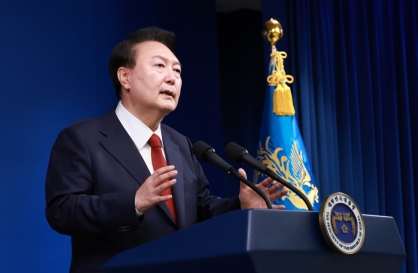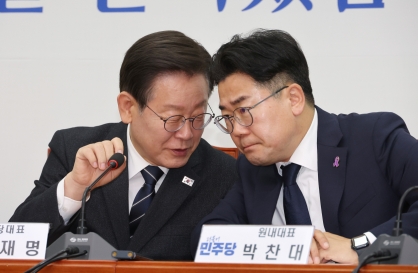Japan estranged as S. Korea and China improve ties
By Korea HeraldPublished : June 30, 2013 - 20:36
Japan appears further estranged from South Korea and China after the latter agreed last week to deepen their cooperation for peninsular denuclearization and strategic partnership in the economy, security and other areas.
Ahead of the upper-house elections later this month, nationalist Japanese politicians including Prime Minister Shinzo Abe have enraged Seoul and Beijing with their recent remarks and behavior that failed to atone for the country’s wartime atrocities.
Becoming the first South Korean head of state to visit China before Japan last week, President Park Geun-hye sought to enhance ties with Beijing, which had suffered setbacks during the preceding government that focused primarily on the U.S.
Park’s state visit to China came as Seoul’s relations with Tokyo remained chilled due to Japan’s refusal to properly recognize its colonial past and repeated claims to Dokdo. Tokyo is also in dispute with Beijing over a chain of islands in the East China Sea.
Obliquely referring to Japan, Park and Chinese leader Xi Jinping adopted a joint communiqu in which they apparently took issue with Japan’s understanding of history.
“We are concerned that the unstable situation stemming from conflicts and distrust among countries in the region continues,” read the communiqu.
Watching the improving ties between Seoul and Beijing, Japanese media expressed concerns that the archipelago state could face diplomatic isolation in the region amid historical and territorial disputes with its neighboring states.
“No prospects emerge of Japan’s summits with South Korean and Chinese leaders even though half a year has passed since the Shinzo Abe government took office,” said Japan’s Asahi Shimbun newspaper in an article Friday.
“The South Korea-China summit could negatively impact Japan’s strategy to lead the international opinion over the Japan-China relations to its benefit by improving ties with the South.”
Seoul’s improved ties with Beijing could bolster its strategic position as some sort of a bridge between the U.S. and China, and between China and Japan, observers pointed out.
“Better ties with Beijing could enhance Seoul’s strategic leverage (in the regional dynamics of power),” said Kim Yeoul-soo, a security expert at Seoul’s Sungshin Women’s University.
“From the perspectives of the U.S. and Japan, Seoul getting closer to Beijing could be burdensome. But from China’s standpoint, closer ties with it could help break the triangular security cooperation among Seoul, Washington and Tokyo.”
Tokyo’s failure to shore up ties with Seoul has been a source of concern for Washington as its “rebalancing” policy toward Asia could be hindered, analysts noted. Under the policy, the U.S. seeks to strengthen Asian alliances to ensure its regional preponderance amid the rise of China.
As if to highlight that their historical antagonisms have impeded practical economic cooperation, Seoul and Tokyo recently decided against extending their bilateral currency swap agreement designed for a better financial crisis management.
Japan’s nationalist moves are expected to be further spurred as the conservative ruling Liberal Democratic Party is expected to win in the upcoming elections. The LDP has sought to revise the war-renouncing Article 9 of the Constitution and make Japan a “normal” state with a full-fledged military.
By Song Sang-ho (sshluck@heraldcorp.com)
Ahead of the upper-house elections later this month, nationalist Japanese politicians including Prime Minister Shinzo Abe have enraged Seoul and Beijing with their recent remarks and behavior that failed to atone for the country’s wartime atrocities.
Becoming the first South Korean head of state to visit China before Japan last week, President Park Geun-hye sought to enhance ties with Beijing, which had suffered setbacks during the preceding government that focused primarily on the U.S.
Park’s state visit to China came as Seoul’s relations with Tokyo remained chilled due to Japan’s refusal to properly recognize its colonial past and repeated claims to Dokdo. Tokyo is also in dispute with Beijing over a chain of islands in the East China Sea.
Obliquely referring to Japan, Park and Chinese leader Xi Jinping adopted a joint communiqu in which they apparently took issue with Japan’s understanding of history.
“We are concerned that the unstable situation stemming from conflicts and distrust among countries in the region continues,” read the communiqu.
Watching the improving ties between Seoul and Beijing, Japanese media expressed concerns that the archipelago state could face diplomatic isolation in the region amid historical and territorial disputes with its neighboring states.
“No prospects emerge of Japan’s summits with South Korean and Chinese leaders even though half a year has passed since the Shinzo Abe government took office,” said Japan’s Asahi Shimbun newspaper in an article Friday.
“The South Korea-China summit could negatively impact Japan’s strategy to lead the international opinion over the Japan-China relations to its benefit by improving ties with the South.”
Seoul’s improved ties with Beijing could bolster its strategic position as some sort of a bridge between the U.S. and China, and between China and Japan, observers pointed out.
“Better ties with Beijing could enhance Seoul’s strategic leverage (in the regional dynamics of power),” said Kim Yeoul-soo, a security expert at Seoul’s Sungshin Women’s University.
“From the perspectives of the U.S. and Japan, Seoul getting closer to Beijing could be burdensome. But from China’s standpoint, closer ties with it could help break the triangular security cooperation among Seoul, Washington and Tokyo.”
Tokyo’s failure to shore up ties with Seoul has been a source of concern for Washington as its “rebalancing” policy toward Asia could be hindered, analysts noted. Under the policy, the U.S. seeks to strengthen Asian alliances to ensure its regional preponderance amid the rise of China.
As if to highlight that their historical antagonisms have impeded practical economic cooperation, Seoul and Tokyo recently decided against extending their bilateral currency swap agreement designed for a better financial crisis management.
Japan’s nationalist moves are expected to be further spurred as the conservative ruling Liberal Democratic Party is expected to win in the upcoming elections. The LDP has sought to revise the war-renouncing Article 9 of the Constitution and make Japan a “normal” state with a full-fledged military.
By Song Sang-ho (sshluck@heraldcorp.com)
-
Articles by Korea Herald









![[K-pop’s dilemma] Time, profit pressures work against originality](http://res.heraldm.com/phpwas/restmb_idxmake.php?idx=644&simg=/content/image/2024/05/08/20240508050705_0.jpg&u=20240508171126)









![[Today’s K-pop] Stray Kids to drop new album in July: report](http://res.heraldm.com/phpwas/restmb_idxmake.php?idx=642&simg=/content/image/2024/05/09/20240509050659_0.jpg&u=)